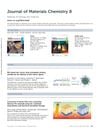 21 citations,
June 2019 in “Dermatologic Surgery”
21 citations,
June 2019 in “Dermatologic Surgery” Platelet-rich plasma (PRP) treatment has been found effective in promoting hair growth for alopecia patients, with minimal side effects like temporary pain and redness.
 15 citations,
August 2021 in “Reviews in endocrine and metabolic disorders”
15 citations,
August 2021 in “Reviews in endocrine and metabolic disorders” COVID-19 and hypopituitarism (reduced pituitary gland function) are linked, with the latter's related health issues potentially worsening COVID-19 outcomes, and COVID-19 possibly increasing risk for pituitary complications.
 August 2015 in “MOJ proteomics & bioinformatics”
August 2015 in “MOJ proteomics & bioinformatics” ePUKs could be valuable for regenerative medicine due to their wound healing abilities.
9 citations,
July 2016 in “JAAD case reports” Denosumab treatment for osteoporosis can cause hair loss.
 February 2023 in “Frontiers in Bioengineering and Biotechnology”
February 2023 in “Frontiers in Bioengineering and Biotechnology” Optical imaging and light therapy show promise for diagnosing and treating liver injury caused by surgery.
25 citations,
March 2022 in “International journal of biological macromolecules” miR-181a-5p helps hair growth by activating a specific signaling pathway.
 18 citations,
March 2022 in “Drug design, development and therapy”
18 citations,
March 2022 in “Drug design, development and therapy” Platelet-rich plasma (PRP) may help with various hair loss types, but more research is needed to find the best use method.
 2 citations,
May 2017 in “The Journal of Dermatology”
2 citations,
May 2017 in “The Journal of Dermatology” A Japanese bone marrow transplant patient developed a rare skin cancer possibly linked to long-term use of the medication voriconazole.
 6 citations,
May 1986 in “Cancer Chemotherapy and Pharmacology”
6 citations,
May 1986 in “Cancer Chemotherapy and Pharmacology” The drug TGU was ineffective against small cell lung cancer and caused significant bone marrow suppression.
 January 2020 in “Mastology”
January 2020 in “Mastology” Flow cytometry was effective in diagnosing metastatic breast cancer in a bone marrow sample.
 29 citations,
October 2020 in “eLife”
29 citations,
October 2020 in “eLife” Higher testosterone levels can increase the risk of certain diseases like type 2 diabetes in women and prostate cancer in men, but can also protect against autoimmune diseases and hair loss. It also affects body fat and bone density.

Higher free testosterone levels can increase bone density and decrease body fat but may raise the risk of prostate cancer, hair loss, and benign prostate enlargement.
 June 2018 in “Reactions Weekly”
June 2018 in “Reactions Weekly” A 65-year-old man developed a serious skin cancer linked to a drug he was taking for a fungal infection after a bone marrow transplant.
 October 2014 in “Archives of disease in childhood”
October 2014 in “Archives of disease in childhood” Childhood cancer diagnosis leads to long-term physical and emotional health issues in parents.
 1 citations,
November 2017
1 citations,
November 2017 The document concludes that while some organisms can regenerate body parts, mammals generally cannot, and cancer progression is complex, involving mutations rather than a strict stem cell hierarchy.
1 citations,
January 2023 in “IntechOpen eBooks” Paclitaxel is an effective cancer drug with side effects and potential new uses beyond cancer.
 2 citations,
September 2020
2 citations,
September 2020 Long-term high testosterone levels can improve bone density and reduce body fat but may increase the risk of prostate cancer and high blood pressure.
 7 citations,
January 2013 in “European Urology”
7 citations,
January 2013 in “European Urology” 5-Alpha reductase inhibitors may prevent prostate cancer but are not widely used due to concerns about trial relevance and potential risks, and more research is needed to confirm long-term benefits.
 9 citations,
November 2018 in “Acta Clinica Belgica”
9 citations,
November 2018 in “Acta Clinica Belgica” Don't combine abiraterone and spironolactone for prostate cancer treatment as it may worsen the disease.
 June 2011 in “Oncology times”
June 2011 in “Oncology times” New treatments are making advanced prostate cancer management more complex but also more hopeful.
 January 2025 in “Cell Communication and Signaling”
January 2025 in “Cell Communication and Signaling” CXXC5 can both suppress and promote cancer, making it a complex target for treatment.
 1 citations,
February 2018 in “Orthopedics and rheumatology”
1 citations,
February 2018 in “Orthopedics and rheumatology” Combining Western chemotherapy with Traditional Chinese Medicine can reduce side effects and improve immune response in treating bone and soft tissue tumors.
 January 2016 in “Journal of Materials Chemistry B”
January 2016 in “Journal of Materials Chemistry B” Advancements in biomaterials and nanotechnology are improving medical applications like hair growth, bone regeneration, and cancer treatment.
 247 citations,
August 2011 in “European Journal of Epidemiology”
247 citations,
August 2011 in “European Journal of Epidemiology” The Rotterdam Study updated its design and objectives in 2012, providing insights into various diseases in the elderly, including skin cancer, bone health, liver disease, neurological and psychiatric conditions, and respiratory issues.
 4 citations,
June 2017 in “Endocrine Reviews”
4 citations,
June 2017 in “Endocrine Reviews” Dihydrotestosterone (DHT) mainly affects nearby cells, doesn't significantly change prostate hormonal environment or cancer risk, and doesn't play a main role in causing hair loss or acne. More research is needed on its effects on heart health, sexual function, and bone health.
 3 citations,
March 2022 in “Haya: the Saudi journal of life sciences”
3 citations,
March 2022 in “Haya: the Saudi journal of life sciences” Dates may improve heart health, fight infections, protect kidneys, reduce inflammation, support pregnancy, promote dental and bone health, enhance mental function, and have anti-cancer properties, and are also beneficial for skin and hair care.

The vitamin D receptor has many roles in the body beyond managing calcium, affecting the immune system, hair growth, muscles, fat, bone marrow, and cancer cells.
 176 citations,
January 2003 in “Journal of Investigative Dermatology”
176 citations,
January 2003 in “Journal of Investigative Dermatology” Bone Morphogenetic Proteins (BMPs) help control skin health, hair growth, and color, and could potentially be used to treat skin and hair disorders.
 14 citations,
January 2013 in “Journal of Cutaneous Medicine and Surgery”
14 citations,
January 2013 in “Journal of Cutaneous Medicine and Surgery” Some cancer treatments can cause permanent hair loss.
 4 citations,
February 2024 in “The Journal of Urology”
4 citations,
February 2024 in “The Journal of Urology” Adding hormone therapy to radiation improves survival for high-risk prostate cancer recurrence but has side effects.


























